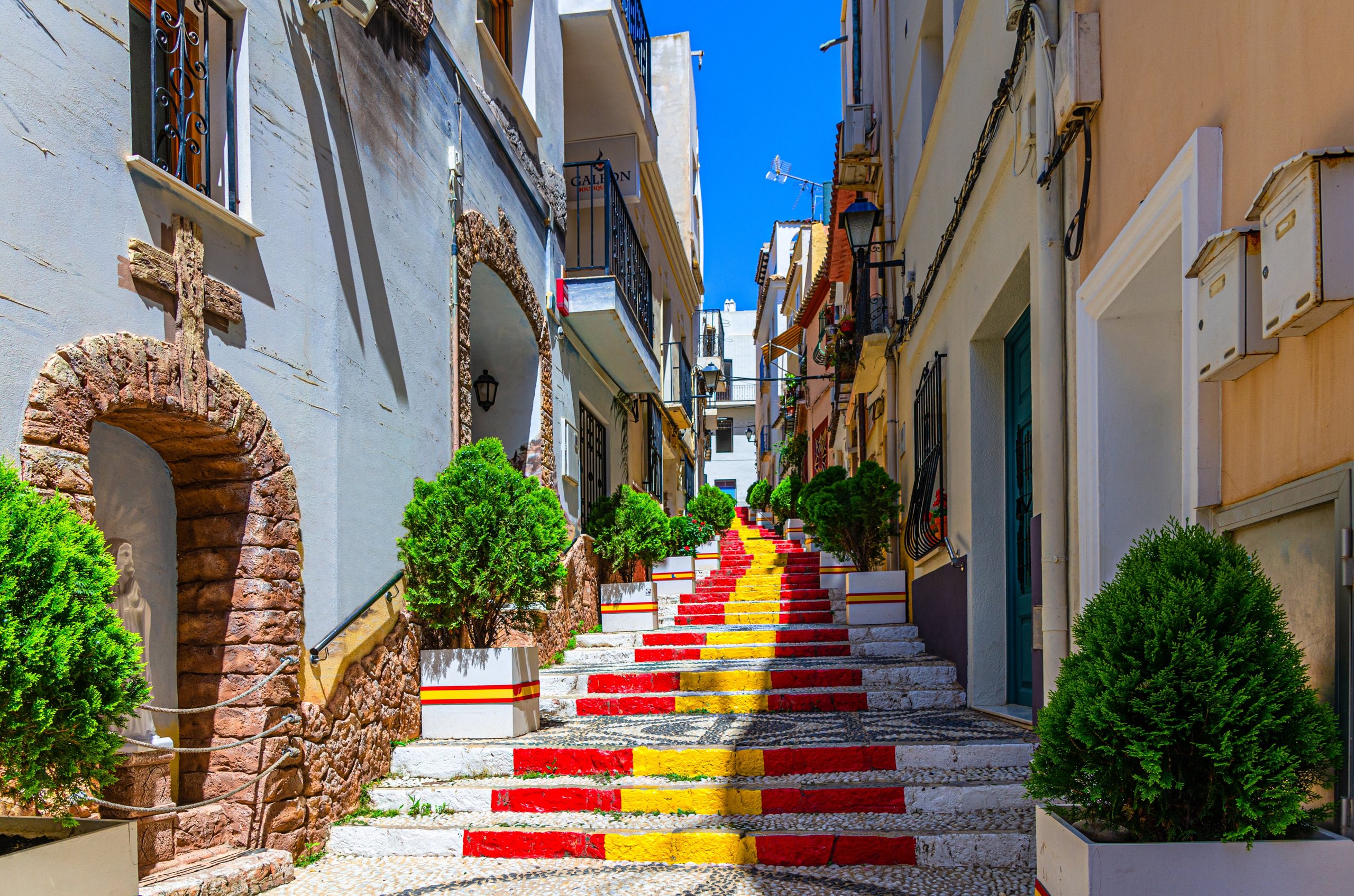Thinking of living in Spain for more than a few months? If so, you’ll need the correct visa or residency permit. Understanding which is the right path for you is one of the most important steps you’ll take before making the move.
If you’re planning to spend extended time in Spain – as a retiree, remote worker or full-time resident – you’ll need the right legal status in place. While buying property is straightforward, staying long-term isn’t automatic. This guide explains the main visa and residency options, who they suit and how the process works, so you can plan your move with confidence.
Download the Spain Buying Guide
Contents
Visa options for non-EU citizens
If you’re a UK, US or other non-EU national, you can visit Spain for up to 90 days in any 180-day period without a visa. This covers holidays, viewing trips and short stays – but if you’re hoping to spend longer in your home, you’ll need to apply for a visa.
Buying a property in Spain doesn’t automatically grant residency. However, having somewhere to live is a requirement if you plan to apply for one of the long-term visa options.
Non-lucrative visa (NLV)
This is the go-to option for most retirees. To qualify, you’ll need to show passive income – this can be from pensions, investments or rental income – totalling €28,800 per year as of 2025, plus €7,200 for each family member (i.e. €36,000 as a couple). Those numbers are based on the IPREM (Indicador Público de Renta de Efectos Múltiples), which is a kind of benchmark minimum wage. In 2025 the IPREM is €600 per month (€7,200 per annum), and for the NLV you must show an income of four times the IPREM, so €28,800.
You’ll also need private health insurance and a clean police record.
Previously, once your application was approved, your passport was stamped with a visa valid for just 90 days. That meant you had to travel to Spain within three months of receiving it. Since May 2025, the rules have changed – the visa now lasts for 12 months and is classed as multi-entry, giving you far more flexibility to plan your move.
The visa is valid for one year and after the first year, you can renew for two-year periods. To qualify for renewal, you must spend more than 183 days in Spain during your first year. After five years, you can apply for permanent residency.
Digital nomad visa
The digital nomad visa allows non-EU citizens to live in Spain while working remotely for companies outside the country.
While it shares some similarities with the non-lucrative visa, such as the requirement for a clean police record and private health insurance, the financial bar is set a bit higher. Instead of the passive income used for retirees, this visa is tied to the Spanish minimum wage. This means that as of late 2025, you’ll typically need to prove a monthly income of at least €2,763, with additional amounts required if you are bringing a partner or children along.
One of the biggest draws of this route is the “Beckham Law” tax regime, which allows you to pay a flat 24% tax on your earnings for your first few years in the sun. It is important to remember, however, that this tax break isn’t automatic – you must apply for it specifically within six months of arriving to avoid the standard progressive tax rates.
The permit is initially valid for three years and can be renewed.
Having a partner who is an EU resident
If your partner or spouse is an EU resident (this includes Irish passport holders), you may be eligible for a residency permit.
This route allows you to live and, in many cases, work in Spain by virtue of your relationship.
To qualify, you will need to provide proof of around €10,000 in a Spanish bank account, private health insurance and a marriage certificate translated into Spanish. You will also need to register at the town hall within 90 days of your arrival to make it legal.
Summary of the main visa types
| Visa type | Who it’s for | Key requirements | Length & renewal |
| Non-lucrative visa (NLV) | Retirees or those with passive income | €28,800 income/year + €7,200 per dependent, no working, police checks, private health insurance | 1 year initially, then renewable every 2 |
| Digital nomad visa | Remote workers for non-Spanish companies | Remote income of €33,156 income/year + around €12,432 for first dependent, police checks, private health insurance | 3 years initially, then renewable every 2 |
Residency options for EU citizens
If you’re an EU citizen, it is relatively easy to become a Spanish resident. The process can be split into four simple steps:
- Register at your local town hall (Ayuntamiento) for a certificate (empadronamiento or “padrón”) that confirms you live in the area.
- Apply for the EU Certificate of Registration (Certificado de Registro) at the foreigners’ office or local police station.
- Provide supporting documents like your passport, proof of address, proof of income or employment and evidence of health cover.
- Get your NIE (Foreigner’s Identity Number), which is essential for opening a bank account, buying property and more.
Benefits of obtaining residency in Spain
Holding residency status in Spain opens up a number of practical benefits:
- Access to public healthcare: after one year, non-working residents can join Spain’s public health insurance scheme, the Convenio Especial, for a monthly fee.
- Tax-free personal imports: you can move your belongings to Spain without paying import duty or VAT on it – your removal firm can help with customs paperwork.
- Freedom of movement: residency allows you to travel freely within the Schengen zone.
- Pathway to permanent residency and citizenship: after five years you can apply for permanent residency and after 10 years you can apply for Spanish citizenship.
 You can apply for citizenship after 10 years of legal residency
You can apply for citizenship after 10 years of legal residency
Obtaining permanent residency in Spain
After five consecutive years of legal residency, you can apply for long-term residency (formerly known as permanent residency). This allows you to live and work in Spain indefinitely, with the same rights as Spanish nationals.
Processing time is typically around three months, and once granted, the status never expires – although you will need to periodically renew your physical long-term residence card itself.
To qualify, you must:
- Have no criminal record
- Have lived in Spain legally for five consecutive years
- Be from a non-EU country
- Be residing legally at the time of application
- Those holding an EU Blue Card for five consecutive years may also qualify
If you’re thinking even longer-term, you can apply for Spanish citizenship after 10 years of continuous legal residency.
Ready to take the next step?
Download our free Spain Buying Guide, packed with practical information on visas, taxes, healthcare and the property market. For further assistance, we can put you in touch with trusted visa experts and Spanish lawyers who can advise and help you with your application.
FAQs about visas in Spain
For most non-EU nationals, the simplest route to permanent residency is to start with a long-term residence visa and build up five years of legal residency. The non-lucrative visa is often the most straightforward option if you don’t need to work, particularly for retirees or those with reliable passive income. Once you’ve lived in Spain legally for five consecutive years and met the minimum stay requirements, you can apply for long-term (permanent) residency, which allows you to live and work in Spain indefinitely. EU citizens follow a similar five-year rule but through EU residency registration rather than a visa.
Spain offers several residence permits depending on your nationality and circumstances. Non-EU citizens commonly apply for the non-lucrative visa if they have passive income and don’t plan to work or the digital nomad visa if they work remotely for non-Spanish companies. Family members of EU citizens can apply under EU family reunification rules. EU nationals don’t need a visa but must register as residents if they plan to stay long-term. Each route comes with different financial, health insurance and paperwork requirements, so the right option depends on how you plan to live in Spain.
Yes, British citizens can still get residency in Spain, but the process changed after Brexit. As non-EU nationals, Brits now need to apply for a visa if they want to live in Spain for more than 90 days in any 180-day period. Popular options include the non-lucrative visa for retirees and second-home owners and the digital nomad visa for remote workers. While the rules are stricter than before, Spain continues to welcome British residents who meet the requirements and many are successfully making the move each year.
You might also like:









